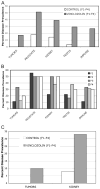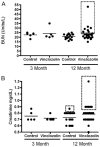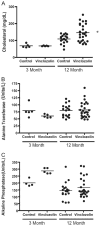Endocrine disruptor vinclozolin induced epigenetic transgenerational adult-onset disease
- PMID: 16973726
- PMCID: PMC5940332
- DOI: 10.1210/en.2006-0640
Endocrine disruptor vinclozolin induced epigenetic transgenerational adult-onset disease
Abstract
The fetal basis of adult disease is poorly understood on a molecular level and cannot be solely attributed to genetic mutations or a single etiology. Embryonic exposure to environmental compounds has been shown to promote various disease states or lesions in the first generation (F1). The current study used the endocrine disruptor vinclozolin (antiandrogenic compound) in a transient embryonic exposure at the time of gonadal sex determination in rats. Adult animals from the F1 generation and all subsequent generations examined (F1-F4) developed a number of disease states or tissue abnormalities including prostate disease, kidney disease, immune system abnormalities, testis abnormalities, and tumor development (e.g. breast). In addition, a number of blood abnormalities developed including hypercholesterolemia. The incidence or prevalence of these transgenerational disease states was high and consistent across all generations (F1-F4) and, based on data from a previous study, appears to be due in part to epigenetic alterations in the male germ line. The observations demonstrate that an environmental compound, endocrine disruptor, can induce transgenerational disease states or abnormalities, and this suggests a potential epigenetic etiology and molecular basis of adult onset disease.
Figures







Comment in
-
Endocrine disruptors: do family lines carry an epigenetic record of previous generations' exposures?Endocrinology. 2006 Dec;147(12):5513-4. doi: 10.1210/en.2006-1282. Endocrinology. 2006. PMID: 17107972 No abstract available.
References
-
- Gluckman PD, Hanson MA. Developmental origins of disease paradigm: a mechanistic and evolutionary perspective. Pediatr Res. 2004;56:311–317. - PubMed
-
- Egger G, Liang G, Aparicio A, Jones PA. Epigenetics in human disease and prospects for epigenetic therapy. Nature. 2004;429:457–463. - PubMed
-
- Bjornsson HT, Fallin MD, Feinberg AP. An integrated epigenetic and genetic approach to common human disease. Trends Genet. 2004;20:350–358. - PubMed
-
- Corwin EJ. The concept of epigenetics and its role in the development of cardiovascular disease: commentary on “new and emerging theories of cardiovascular disease. Biol Res Nurs. 2004;6:11–16. discussion 21–23. - PubMed
-
- Sakatani T, Kaneda A, Iacobuzio-Donahue CA, Carter MG, de Boom Witzel S, Okano H, Ko MS, Ohlsson R, Longo DL, Feinberg AP. Loss of imprinting of Igf2 alters intestinal maturation and tumorigenesis in mice. Science. 2005;307:1976–1978. - PubMed
Publication types
MeSH terms
Substances
Grants and funding
LinkOut - more resources
Full Text Sources
Other Literature Sources
Medical

